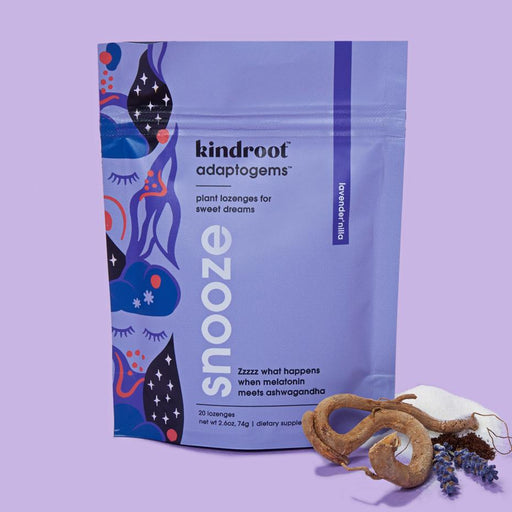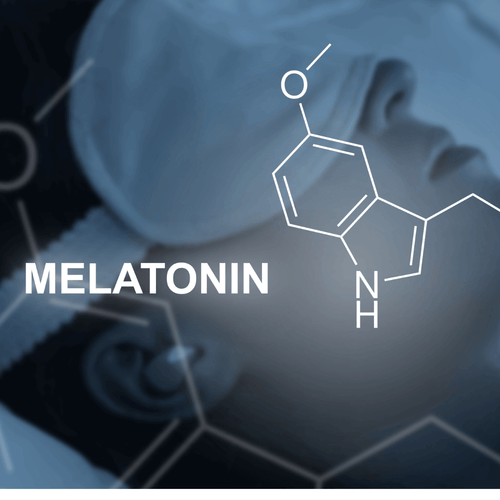Melatonin is well known for being an effective sleep aid, but does the popular supplement cause nightmares and weird, vivid dreams? The short answer is that melatonin can affect dreaming, but it’s relatively rare, and the mechanisms behind melatonin dreams are unclear.
The following offers expert insights about the role melatonin plays in dreams and nightmares, plus tips to avoid bad dreams when taking melatonin.
Discover Kindroot Snooze: Melatonin + Ashwagandha Lozenges for Sleep
Contents
- Does melatonin cause nightmares and dreams?
- Why melatonin can affect dreaming
- What about melatonin and lucid dreaming?
- How to avoid nightmares when taking melatonin
- Nightmares and dreams shouldn't scare you away from melatonin
Does melatonin cause nightmares and dreams?
Search the Internet, and you’ll undoubtedly find reports from people who say melatonin causes them to have more vivid dreams. Others claim melatonin gives them nightmares.
Vivid (or even weird) dreams are probably more common than nightmares. Research conducted in 2014 on the effectiveness of melatonin for promoting healthy sleep analyzed 35 independent studies for evidence of adverse events related to taking melatonin. No serious events were reported, and of the 35 studies analyzed, only one reported nightmares as a potential side effect of melatonin.

That said, anecdotal evidence abounds, and it certainly seems like there is a link between melatonin and dreaming.
Melatonin, the Ultimate Guide: Uses, Side Effects, Safety & FAQ
“Although such occasions are rare, some people who take melatonin report having vivid or strange dreams and nightmares. The statistics aren’t clear yet, and this subject requires further looking into,” says Dr. Po-Chang Hsu, M.D., a medical content expert at Sleeping Ocean whose specialties include neurology, pediatrics and neonatology.
Dr. Hsu says that when people do have nightmares while taking melatonin, the most common scenarios are those that they experience when they’re not taking the supplement: falling, being chased, missing an important event, or the death of a loved one.
Free Sleep Tracker: Track your sleep patterns & how they influence your day
Why melatonin can affect dreaming
Though the precise mechanism behind why melatonin can cause vivid dreams or nightmares isn’t fully understood, most experts believe it’s rooted in the fact that melatonin causes us to stay in REM (Rapid Eye Movement) sleep longer.
REM sleep is the stage during which we dream. The longer you stay in that stage, the more likely you are to dream and the more dreams you’ll have.

Exactly how melatonin increases REM sleep is another question.
“There are two different theories on how this happens. One, based on a jet lag study of airline employees, believes that melatonin releases vasotocin,” says Dr. Benjamin Gibson, PharmD, PAHM, author, and international podcast host. “In another study in rats, however, melatonin inhibits the substance-P induced secretion of vasopressin and oxytocin from the rat hypothalamo-neurohypophyseal system.”
Read: How to use melatonin for jet lag: What sleep coaches say
There’s very little research on the latter theory, but we know that oxytocin plays a role in vivid dreams and vasopressin may be involved in dream recall, so it stands to reason that altering oxytocin and vasopressin levels may influence dreaming.
For now, though, the vasotocin theory carries more weight.
Vasotocin, melatonin and dreams
Your brain produces its own melatonin in the pineal gland. During REM sleep, melatonin plays a role in the release of vasotocin, which works to erase short-term memory while you’re dreaming. Some experts believe that vasotocin is responsible for helping us distinguish between dreams and real life, and a reason why we typically forget our dreams upon waking.
Can melatonin make you smarter? Here’s what doctors say
Vasotocin might also help us stay in REM sleep longer, causing us to have more dreams. Again, this isn’t clear – because vasotocin is an amnestic agent, it stands to reason that it should help us forget our dreams when taking melatonin, not make us think melatonin causes more dreams, but it seems some people experience the opposite effect.

Another theory suggests that melatonin could enhance memory. Though vasotocin plays a role in helping us forget dreams, researchers have shown that a melatonin byproduct called AMK might help improve long-term memory. If that’s true, then it’s possible that we don’t have more dreams, more vivid dreams, or more nightmares when taking melatonin – we’re just remembering them better.
However, some experts remain skeptical.
“Research suggests that melatonin releases an amnestic agent called vasotocin during the night, which is responsible for erasing memories when dreaming,” says Dr. Hsu. “Therefore, we can’t claim that melatonin actually helps people remember their vivid dreams and nightmares.”
What about melatonin and lucid dreaming?
Some people claim that melatonin can help them lucid dream, but Dr. Hsu debunks that notion.
“There is no evidence that melatonin can help people achieve lucid dreaming,” he says.
Furthermore, he says there is no evidence proving that some people are more likely to experience vivid dreams or nightmares when taking melatonin.
Ultimately, even though we know that melatonin has an influence on dreaming, we’re still not sure how it works – and it certainly doesn’t impact everyone, every time.
How to avoid nightmares when taking melatonin
Dreaming vividly when taking melatonin isn’t inherently a bad thing – many consider it a bonus – but you probably want to avoid weird or disturbing dreams and nightmares. The good news is it’s possible to enjoy the sleep-inducing benefits of melatonin yet avoid nightmares and weird dreams. Here are some tips.
How melatonin boosts immunity, according to experts
1. Lower your dosage
You don’t need a high dosage of melatonin to drift into sweet slumber. While some products are available in 5mg and 10mg doses, you probably only need 2mg to 3mg to get the sleep you’re seeking.

“Higher melatonin doses may cause mild anxiety as a rare side effect,” says Dr. Hsu. “In this case, a person is more likely to have a nightmare or see something worrying in their dreams.”
Luden's Melatonin Soothers were discontinued. Here’s a better alternative
2. Take melatonin an hour before sleep
Some experts recommend taking melatonin an hour before you intend to fall asleep, rather than right before bed, which gives you time to unwind and de-stress. The idea is that you’re more likely to have nightmares if you don’t allow yourself that natural transition from wakefulness to sleep.
Unisom VS. Melatonin: Which is best for sleep?
3. Reduce stress levels before bed
Similarly, it’s a good idea to actively work to reduce stress before bed, since stress can cause bad dreams. Adopt a calming bedtime routine to foster stress-free sleep.
Does melatonin help with anxiety? Here’s what doctors say
“Because science still can’t prove the connection between melatonin use and nightmares, it’s hard to find a working solution that can help prevent the latter,” says Dr. Hsu. “That being said, it might be a good idea to reduce one’s stress levels before bed. Anxiety and stress are associated with an increased risk of having bad dreams, so it’s better to mitigate distress to prevent nightmares. Even simple relaxation techniques might help.”
Dr. Hsu recommends trying activities such as:
- Mindful breathing
- Meditation
- Yoga
- Stretching
- Massage
- Journaling
He says the same applies to children who have been prescribed melatonin.
“Parents should help their kids wind down before bed to reduce stress and, consequently, chances of having bad dreams,” he explains.
4. Eliminate other causes
Alcohol, medications, irregular sleep schedules, work and life stress, and even horror books and movies can all influence nightmares and dreams.
Consider other causes and work to reduce or eliminate these stressors to help achieve a healthy, restful sleep with sweet dreams.
5. Only use high-quality melatonin
Since melatonin is a supplement, it’s not regulated by the FDA like medication is. That means quality varies significantly between brands, and you can’t always trust the dosages printed on the labels. Look for melatonin supplements from trusted brands that use natural, organic ingredients without a lot of sugars and fillers.
Deep dive: The best melatonin supplements, according to doctors

Taking a melatonin supplement with ashwagandha could also help. That’s because melatonin helps induce sleep, while ashwagandha lends a sense of calmness that can help you stay asleep longer, with less stress.
Kindroot Snooze: Melatonin Lozenges Made with Natural Ingredients
Nightmares and dreams shouldn’t scare you away from melatonin
If you’re seeking a natural way to help you get to sleep, the prospect of having vivid dreams or nightmares shouldn’t scare you away from melatonin. The fact is that nightmares are exceedingly rare – remember, only one of 35 studies even mentioned nightmares as a potential side effect – and there are ways to prevent bad dreams if you do experience them.
Best over-the-counter sleep aids: What doctors say
Choose an appropriate dosage – 2mg to 3mg – and take melatonin an hour before bed. During that hour, practice relaxation techniques such as meditation, yoga, mindful breathing and journaling – all good ideas to help prevent insomnia anyway.
If you still experience disturbing dreams, then you might need to lower your dosage or consult with a medical professional well-versed in sleep issues. Chances are, however, that you’ll be able to take melatonin to help you sleep without experiencing any negative side effects.
Disclaimer: The information stated in this article is for educational purposes only. The information stated is not intended to treat, diagnose or cure any disease, condition, or other physical or mental ailment of the human body. The desire to make any changes to one's dietary habits or supplementation should be consulted and discussed with a licensed medical professional.




